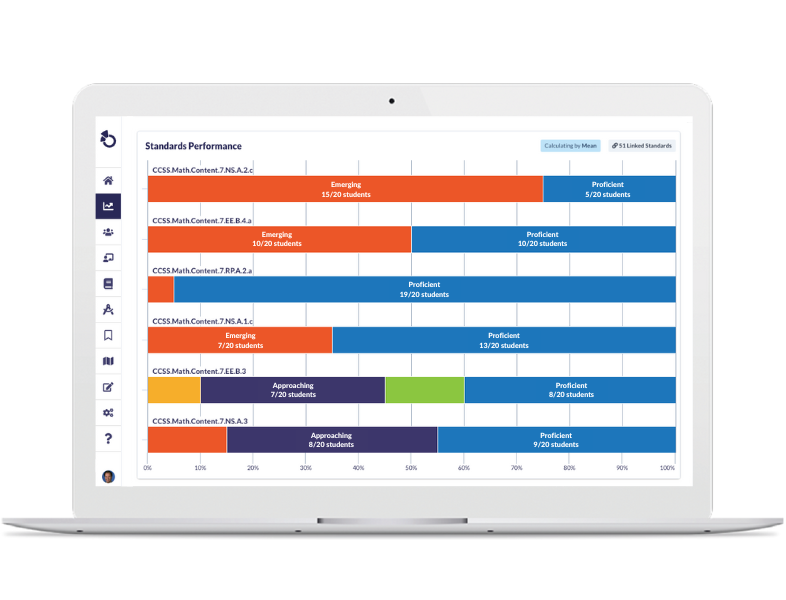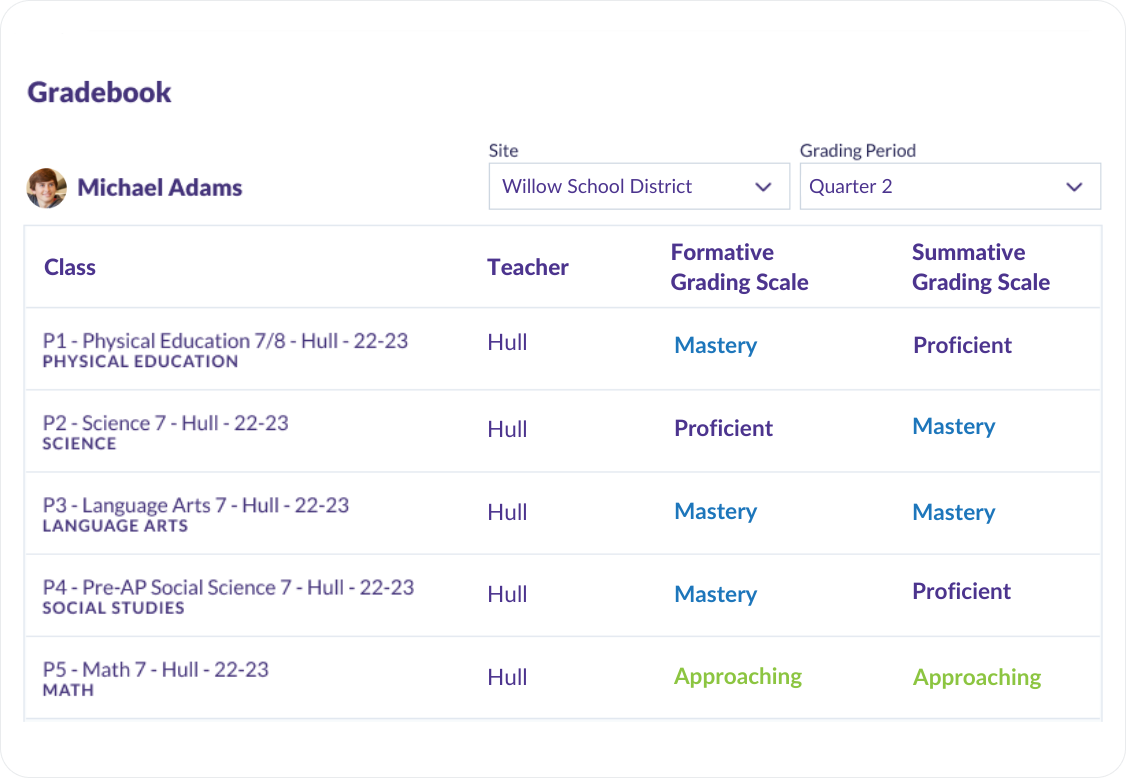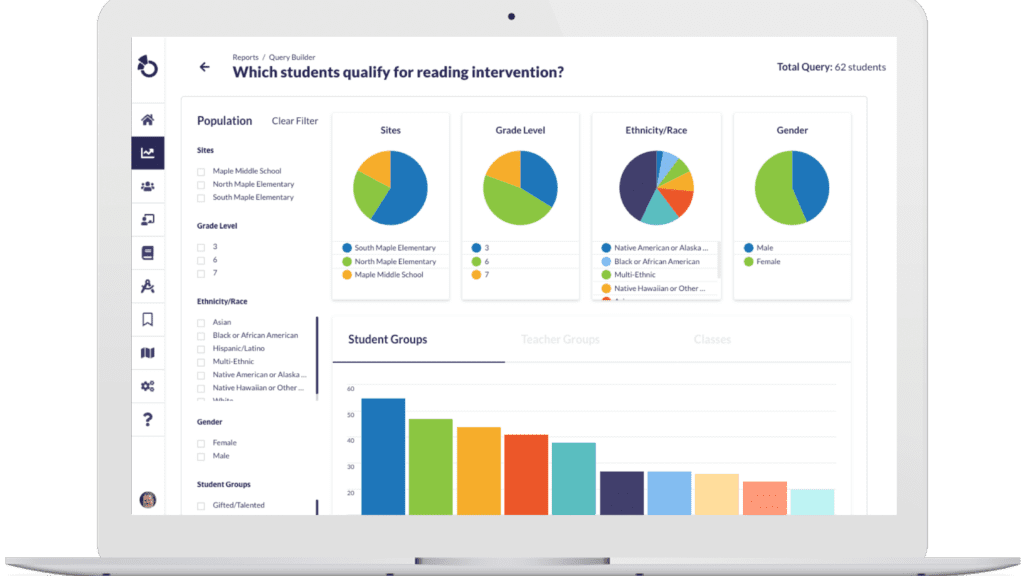Transforming Teaching and Learning: Wilmot Union's Standards-Based Grading Success Story

At our latest Otus Regional Workshop in Salem, WI, we took a break from a busy day of collaboration to chat with Don Norwick, Associate Principal of Curriculum & Instruction at Wilmot Union High School in Wilmot, Wisconsin. Serving a diverse student body of over 900, Wilmot Union High School has been navigating a significant shift toward standards-based grading, a journey marked by both challenges and remarkable achievements. This insightful discussion with Don Norwick offers a glimpse into the school's innovative approach, the strategies they employed, and the successes they've celebrated in reshaping their learning environment. Meet with the Otus team to see how Otus can support your school.
Three Key Insights from Wilmot Union High School's Educational Transformation
Refining Assessment with Standards-Based Grading
Wilmot Union High School's shift to standards-based grading marked a pivotal change in its approach to student assessment. This move aimed to enhance the accuracy and relevance of evaluating student learning, moving away from traditional grading methods that often fail to capture the full spectrum of student abilities. The transition involved rethinking assessment strategies to focus more on student growth and learning outcomes. This approach aligns with a broader educational trend toward more meaningful and individualized assessment. In this transformative process, Otus proved to be an instrumental platform, providing the necessary tools and resources that aligned well with the school's evolving grading philosophy, thus playing a key role in supporting and advancing their educational practices.

Educators can easily understand how students are progressing towards the standards measured on an assessment in Otus, enabling them to respond to needs more quickly and close achievement gaps.
Empowering Educators Through Professional Development and Support
Introducing a new grading system at Wilmot Union High School meant that teachers needed strong support and training. The school understood the challenges of learning new methods, so they focused on providing professional development and encouraging teachers to take lead roles. This approach is essential for making big changes in education successful. By offering the right training and support, Wilmot Union High School made it easier for its staff to adapt and enhance their teaching strategies. Otus was key in this effort, providing ongoing training opportunities and a platform for teachers to work together, share ideas, and get a better grasp of standards-based grading.
Fostering Collaboration and Community Involvement
The adoption of standards-based grading and Otus at Wilmot Union High School has led to increased collaboration among educators and deeper engagement with the community. This collaborative environment is essential for the success of any educational initiative, as it encourages the sharing of ideas and strategies that benefit student learning. The school's use of Otus has not only improved internal communication among teachers but also enhanced their ability to engage with parents and the community. By providing detailed insights into individual student progress, Otus has enabled teachers to communicate more effectively with parents, fostering a more inclusive and informed educational community.

Schools can choose to provide families real-time access to Otus or they can communicate progress with an easy-to-understand standards-based report card. Otus helps schools like Wilmot improve visibility into student progress for families and cultivate a stronger home-to-school connection.
Interview Transcript
Hillary Kleppel
All right, Don, if you could start me off with your name, school district, and role.
Don Norwick
My name is Don Norwick. I'm the Associate Principal of Curriculum & instruction at Wilmot Union High School in Wilmot, Wisconsin.
Hillary Kleppel
Awesome. Can you tell us about Wilmot a little bit and about your community?
Don Norwick
Wilmot is a fringe rural community, basically 20 minutes from major urban centers. We probably identify more as rural. We have about 931 students. We're one high school district. We have about, I would say, five feeder schools that feed into us directly, and then open enrollment, as well, kind of affects our enrollment.
Hillary Kleppel
Cool. And you guys are about seven months in with Otus. What has that journey been like for you? What are the pain points?
Don Norwick
Our journey with standards-based grading and looking for a grade communication tool has been way longer than that in this role that I've been in for two years. One of our biggest things was controlling a pilot committee last year and trying to search out for the current grading tool that we were using at the time. What can it do for us? How can we better communicate standards-based grading and everything like that with our community? And through that journey, we were banging our heads against the wall, and luckily, in the midst of all this, I feel like we were literally at our wits' end. I got in contact. I heard about Otus in Illinois, and I got in contact with a rep, and it seemed to deliver everything that we wanted from what we didn't have and everything we were looking for in a grading-based platform. So then met with the reps, kind of talked them through it, and then we started like, yeah, this could be exactly everything that we're looking for, and we're along that journey right now.
Hillary Kleppel
Yeah. And what's the buy-in been like with your teachers? As a former educator, I know that's not always easy. So what has that been like?
Don Norwick
It's new. And the thing is, with anything new, there's going to be a learning curve. But I think we have a good mixture on our staff of great teachers, you know, the teacher leader support team that I've created at Wilmot. We lead professional development sessions. We're helping our staff understand how to better use. And the thing that we're pitching now is it's new, but so was the previous grading system that we used, and we went through the same exact thing. We just had it a little bit longer. So it's breaking that comfort level. People like doing what's comfortable, but they're seeing the value in using Otus and what we're trying to do.
Hillary Kleppel
As a school being new to standards-based grading and really kind of pushing it through, as other districts are starting to look at, it's becoming really big within the country and whatnot, what is your advice to other districts who kind of want to start to adapt and bring it on?
Don Norwick
Don't be afraid of the process would be the first one. And I think the number one selling point is, and I would say in all cases, you already have a very dedicated staff that wants to do what's best for students. So the sell of SBG, the sell of these grading, it's not hard. It's just the fact as teachers and as a former educator myself, you strive for perfection and you strive for being comfortable within that perfection. And the whole idea behind SBG is that it's not going to be perfect, and that's perfectly okay. So making sure you're providing those support structures, and we're working as a team, we're working as a family. So I think we're starting to get that a little bit more. And one thing that I think has been invigorated, especially at our high school, is collaboration. As we're using the same thing as where you're doing this and the student buy-in, we're fighting the traditional grading model. That's the other part I would kind of say is that, absolutely, we've all been graded on the traditional grading model, but we all know what it's like to be graded based on standards as well.
And that's probably more real-world application than anything else. So it's not that hard to compare, and I think overwhelmingly with SBG. Use the sports analogy. Right. You have practice and then you have game time. You have that playing time, and what counts, but you don't practice, you don't play as well, and that sort of thing. So it's going to take time, there's going to be some growing pains. But the fact is you'll get that buy-in, you'll get the staff behind it, and you need that strong, supportive team of teacher leaders that are going to pull you through.
Hillary Kleppel
I love that. So I heard it's okay not to be perfect.
Don Norwick
Yes.
Hillary Kleppel
Very much collaboration, which we love with Otus. Since transitioning to standards-based grading, what successes have you learned or have you seen, I guess, within your crew? And was there something within our platform, within the Otus platform, that particularly helped within this standards-based grading transition?
Don Norwick
So let's see. Let's start with successes. A couple of successes that we've seen is the reinvigorating nature of standards-based grading.
I have teachers that have been teaching 10, 20, almost 30 years, and they're actually identifying this as one of their more valuable years, and saying, 'I feel like I'm actually teaching students, gauging their learning, and seeing those growth points.’ And that's something I think Otus does an amazing job with, that individual growth and progress, monitoring, tracking, and being able to share that with parents and staff.
How can we all address this as a greater community? Because that's something that you're going to want when these professionals enter in.
Hillary Kleppel
Sure.
Don Norwick
That would be, I'd say one of the major successes is just, I think the collaboration, as mentioned before, teachers are collaborating more now than ever. And it's just they have that universal tool to start using. And it's exciting too, when you see teachers teaching teachers that are also excited about it. So it's like, this is what I want to do. And then you go, oh, actually, Otus can do that. This is how you do it.
And one of the great things about Otus and that they offer is the training, the live videos, the training, the educator sessions. So we have our staff using the chat feature on the website. I'm all over the place here, but I would say with that chat feature, the one thing you can tell immediately is I'm talking to a former educator, I'm talking to someone who's been in education. Just the way they format their answers and kind of walk you through things, they understand it from a teacher perspective and what they're going through. Same thing with a parent. So I have teachers who are also parents of students in the same school and they've used them both interchangeably. And they can speak so highly of your support staff.
Hillary Kleppel
Yeah, that is definitely something we pride ourselves on. The entire client success team is all former educators. So we've all have that relatability of, we've been in the classroom, we know what it's like, whether it's from the buy-in to the student right in front of you. You need that assessment answer right now. So that's really cool to go along with some of the training and whatnot, you have been able to join our Otus certified educator program. Can you talk a little bit about that and how it's helped you kind of your growth with Otus and your team?
Don Norwick
So being my second year as administrator, Otus looks significantly different from a teacher than it would be as an admin, for sure. And what OCE has allowed me to do is actually get on that teacher-student platform and get a little bit more view of the people that I'm going to be working with and how they're going to be using it and utilizing it. And then another way of getting my staff on board and also entering into OCE, we can all collaborate together on the modules that are assigned and the questioning on discord, and you're creating more of that collaborative environment and reaching out and actually trying the things, then we can bring that back to our staff and say, this is exactly how you do it. And then also, by the way, you can do it as well. You can join these programs at three different times during the year. There's three different programs you can be a part of. Even within the team that I created at Wilmot, we have, people have done each one individually, and now we're kind of sharing different things that we've seen.
Hillary Kleppel
Amazing.
Don Norwick
So I would say from my perspective, it gave me another lens because it's a little bit more difficult, but it's hard for me to see how a parent would see it, how a student would see it, how a teacher would see it, because I'm no longer in that craft of teaching. I'm in a supportive teacher role. So it's great to see. Like, now I can actually go, oh, yeah, you click on this, you go to this, and it's very clear and concise. And the thing I like about OCE is it forces you to do it. Right. It's not just a video saying, oh, cool, I explained it. No, actually physically go in and do it, create it, and then you can see it, and then we can go back and reference that in the future.
Hillary Kleppel
I love to hear that. Well, thank you!
Related Resources
Request a demo!
See exactly how Otus can help your school accelerate student growth and improve student outcomes – all while saving educators time.

